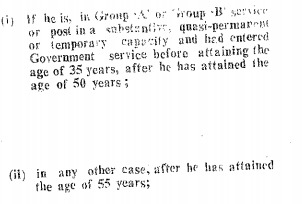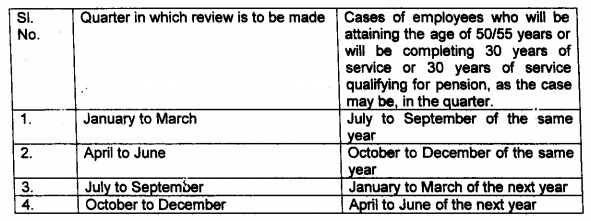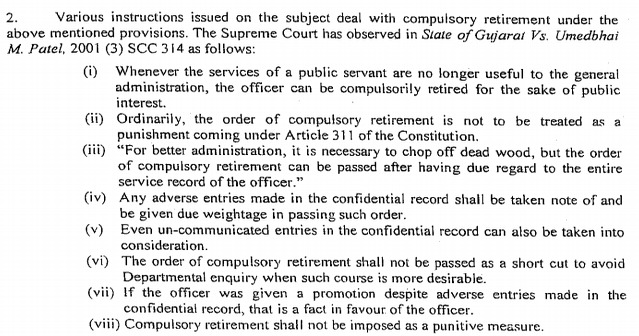[orc]Compulsory retirement of government officials is in the news again after NDA government’s recent Order about the review of employees’ performance. But available information suggests that this is not a new step. The UPA government had issued a similar order in March 2014.
The news that the NDA government has decided to review the performance of government employees (central) at the age of 50, leading to compulsory retirement of inefficient officials, created quite a flutter. News articles were written about the uneasy relationship of the higher bureaucracy with the NDA government and this order by the government was also seen in that context. But, available information suggests, that the office memorandum (OM) by the Department of Personnel & Training (DoPT), dated 11th September, 2015 is nothing new. A similar OM was issued by DoPT in March 2014 during the UPA government.
Compulsory Retirement
All central government employees are governed by the Fundamental Rules (FR) and also the Central Civil Services (CCS) rules. Compulsory retirement as a provision is contained in both FR & CCS pension rules.
Rule 56(j) of Fundamental Rules (FR)
The fundamental rules governing all central government employees contain provisions for the compulsory retirement of any official. Rule 56(J) of the FR says that “The appropriate authority has the absolute right to retire, if it is necessary to do so in public interest, any Government employee as per provisions of Rules”
For Group A & Group B officers, the following criteria must be met for this provision to be applicable,
- Entered service before 35 years of age
- Attained 50 years of age
The other category of employees must have attained an age of 55 as per rule 56(j).
Rule 48 of CCS Pension Rules
The provision of compulsory retirement is also contained in Rule 48 of the CCS Pension rules. Rule 48 says that All Government servants covered by CCS (Pension) Rules, 1972 who have completed 30 years of qualifying service can be asked to compulsorily retire by the appropriate authority in public interest.
In both the above cases, the notice period to be served is three months.
The Process
The cases of Government servants covered by the above provisions should be reviewed six months before he attains the age of 50/55 years or completes 30 years service. The below time schedule is to be followed for the sake of this review.
A register of employees who are due to attain the age of 50/55 years or complete 30 years of service is to be maintained. The register should be scrutinized at the beginning of every quarter by a senior officer in the Ministry / Department and the review is to be undertaken according to the above schedule.
What does the present OM say?
The DoPT’s OM dated 11th September, 2015 lists some important Supreme Court judgments on the above provisions apart from reiterating the entire process. The OM cites the observations of the Supreme Court in State of Gujarat Vs Umedbhai M Patel, that compulsory retirement need not be treated as punishment and that dead wood needs to be chopped off for better administration.
The OM also talks about integrity & the conduct of the official and cites relevant Supreme Court observations on the issue. On the issue of integrity, the OM cites an observation that any officer would live by the reputation built around him and, that if his conduct & continuance in service would be injurious to public interest, then compulsory retirement as an option has to be utilized.
What about the All India Service Officers (AIS)?
For AIS officers, the provision of compulsory retirement is contained in Rule 16(3) of the All India Services (Death-Cum-Retirement Benefits) Rules, 1958.
Will it work?
While the data on the number of central government employees asked to compulsorily retire under the above provisions is not readily available, it appears that this provision is not used often. The OM from the NDA government should also be seen in that context. Unless the review process is taken seriously and this provision is used against erring officials, things are not going to change. Let’s hope that the government does it seriously this time around.









1 Comment
Some central Government employees have received a notice of Compulsory retirement as per Ccs conduct rule FR 56 j for their under performance as per Screening committee report from higher authority without any prior warning or action.
Although their past APAR reports r good. The higher authority didn’t give their chances to defend and their review procedures r also doubtful.
Can the authority take such kind of action and is it legal or justified?